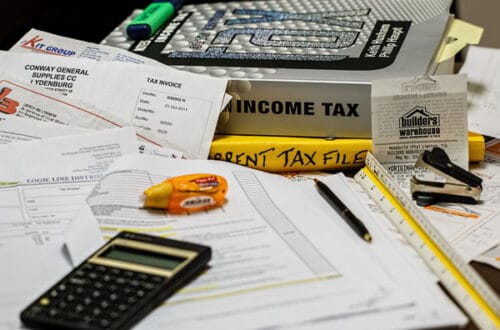
Can You Be Your Own Business Accountant?
When you are self-employed you are responsible for all aspects of your business, including the financial ones. So, is it necessary to employ an accountant or can you do it yourself?
It comes with a wide range of responsibility, including the financial side of the business.
Not only will you need to ensure you are making enough money to pay yourself but anyone who you owe money to. In the future when you expand you will need to pay your staff correctly and most importantly you will need to pay them on time.
Asides the payroll, there is tax that you need to work out and pay, as well as your obligations to the National Insurance and your pension providers.
Can I Learn Accounting Myself?
For a lot of people who are self-employed, they use an accountant for the job. But, is it really necessary?

There are of course many people who choose to handle their business accounting themselves.
They keep a set of books that is both organised and tidy, setting their business up with invoice software and online bookkeeping, managing their own annual tax returns.
When it comes to managing the financial side of your business yourself, there is no doubt that you need an understanding of accounting procedures and processes.
As well as developing business habits that are sound, understanding accounting will allow you to manage the finances of your business effectively.
A business that is well-run is one where the owner has an understanding of the value of the business as well as a real-time understanding of its financial health.
It is possible to learn the necessary skills to manage your business’ finances, using the likes of online accounting courses, and basic bookkeeping courses.
From understanding cash flow to maintain a profit, there are indeed many different aspects of business finance, and they don’t need to be time-consuming or complex.
Online Accountancy Courses For Adults
Have you got what it takes to become a successful accountant?

Do you need to overcome a gap in your skill set to land your next accounting job?
Are you a business owner who needs to understand the fundamentals of your bookkeeping?
If you are ready to advance our carer in accounting, there are a range of online courses available to help you find success.
You can become fluent in the accounting topics you need to focus on to move from beginner to intermediate to advanced.
Whether you need to improve your accounting skills for your own business or you want to follow a career path in bookkeeping, you will find the course for you.
These professional courses will give you the training you need to manage your accounts or advance your accounting career.
These professional accountancy training courses are available in English, Hindi and Arabic.
Does a Business Have to Have an Accountant?
Taking care of your business accounts can be a daunting task for the self-employed small business owner.

The best way to decide whether you need a bookkeeper or accountant for your business is to assess your business, its nature, and your role within it.
Why Do Businesses Need an Accountant?
To be organised:
The days of businesses having accounting books and filing cabinets are in the past. In today’s business accounting world, the Internet has replaced all this. All you need nowadays in order to get your accounts in order is good accounting software.
For Business Growth:
We all know the importance of the financial sector of your business. If you wish to grow your business more, then its financed must be involved. If you don’t have proper business records or a business plan, you may not have any idea about the state of your finances. When this is the case, you are inadvertently hindering the growth of your business.
Saves Time:
Most people set up a business that is to do with something they love and something they have dreamt of doing for many years. This enthusiasm however generally does not extend to the accounting and financial side of the business.
When you hire an accountant it allows you to focus on what you really want to do (make money) whilst they take care of the mundane and boring financial side such as making sure your taxes are paid on time.
Keep Up To Speed:
Deadlines for taxes along with amounts and limits change quite regularly. It you are unaware of this, your next tax bill could be way more than you bargained for.
When you use the services of an accountant, deadlines will be met, and the right amount of tax will be paid to the right people at the right time. Trying to understand the system yourself can be tricky, and using an accountant will free up this time that you can then spend on what you really like doing.
Save Money:
When you employ a good accountant, he will look at ways that you can cut down on business costs, such as claiming for expenses that you are entitled to.
Do You Need an Accountant if you are Self Employed?
As a sole trader, your books will be simple to keep; you will need to simply record the money that goes out and comes in.

As well as this, you must tell HMRC that you have set up and are trading, and pay your NI and tax on time as well as doing your annual returns.
As long as you are familiar with Excel spreadsheets, keeping up to date with your finances and getting your self-assessment right shouldn’t be too tricky.
Do You Need An Accountant for a Limited Company?
As a limited company, you are required to file accounts at both the tax office and at Companies House.
These files will include a balance sheet and a profit and loss sheet. If you are unsure of how to create these, it may be worthwhile considering getting the help of an accountant.
You may however decide that you have the knowledge and understanding necessary to manage your accounts yourself.
Accounting Software
Some smaller business owners have found a compromise between doing their accounts themselves and hiring a professional – accounting software.
Accounting software available in off-the-shelf packages can help you with your books and your VAT returns.
More complex packages available can help you with your sales, accounts, purchases, manufacturing operations, and even with your customer relationships.
Most packages available charge a monthly fee and offer telephone or local support.
How Can I Do My own Bookkeeping?
When you are managing your books yourself as a newbie, it can all seem a bit overwhelming. However, managing your accounts is part of running your business and part of being self-employed.

Here are 5 tips for business owners for managing your books:
Keep Self Employed Books from the Start
Start recording all your costs and sales from the moment you set up your business, keeping receipts for everything you buy.
It is normal to incur costs before you start trading. These can be deducted from your profits at a later date, therefore reducing your tax liability.
Keep up to date, recording everything from day one, ensuring you are aware of the dates for VAT, tax, PAYE, etc. When you pay late, you can end up with penalties and heavy fines.
Get a Bookkeeping System
At the very start of your operations, set up an accounting system. It doesn’t need to be highly sophisticated and could even be a manual system.
It is however wise to use a spreadsheet or a basic accounting system.
If you are going to be using the services of an accountant, agree on a system.
If you use a system recommended by or used by your accountant of choice, it could save you money on fees. Some basic systems even offer ready-made spreadsheets free of charge.
Get Bookkeeping Advice
You may like to consider going on a free workshop from the HMRC. These workshops are very good and more importantly they are free.
There should be a workshop that is free running in your local area that will cover:
- Employer online filing and the running of your payroll
- Self-assessment for the self-employed and becoming self-employed
- Construction Industry Scheme
- Advice on how to set up a limited company
- VAT: an introduction
- An introduction to the basics of international trade
HMRC also provides a payroll solution that is free and that includes everything you need to meet your filing responsibilities as an employer
Budget for Tax
Although your income minus your costs is the profit you make, not all of this money is for you.
You will need to pay your taxes, so make sure you budget for this to avoid a shock when it’s time to do your annual returns.
A great way to do this is to open a savings account where you can put money aside, somewhere along the lines of 25 to 30% of your income.
Claim for all Business Expenses
As a general rule of thumb, you can claim for all costs that you incur that are “wholly and exclusively for business”
Remember to keep receipts for absolutely everything including travel tickets, stamps, and stationary.
Claim for all your business trips, even if it’s just a trip to send a parcel. You can even claim up to 20p per mile of your journey if you choose to cycle to the post office instead of taking your car.
If you are going to be working from home, you can claim back a proportion of your bills for internet, lighting, heating, telephone, and even your mortgage interest.
However, if you claim for your mortgage interest, you may have to pay Capital Gains Tax should you go on to sell your home.
Whether you decide to be your own business accountant or employ a bookkeeper, it is still important to understand the basics of accounting.
Read more about learning accounting skills as a business owner to help your business grow.





2 Comments
Pingback:
Pingback: